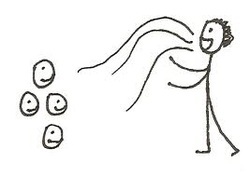 My late rebbe, R' Zalman Schacter-Shalomi, zt"l, (זכר צדיק לברכה) was a master storyteller. He taught: "a good story is one where the mind surprises the heart". "A Year of Stories" is dedicated to his memory. I invite you to forward the link to these stories so that they find their way into the hearts of other tellers and listeners. ∞ ∞ ∞ ∞ ∞ ∞ ∞ ∞ ∞ ∞ ∞ ∞ ∞ ∞ ∞ ∞ ∞ ∞ ∞ ∞ ∞ ∞ There once lived a king who had twin sons. Though they looked exactly alike, their personalities were different as night and day. One was a devout pessimist, the other an incurable optimist. When they came of age, the king decided it was time to open their eyes to the other side of life, and he planned to do so through the gift that he would give to each of them. For the pessimist, he went to the royal jeweler. "I would like him to have the finest watch ever made", he said. "Money is no object - jewels, diamonds, gold, platinum- the best. And I want it ready by his birthday." For the optimist, he went to the Palace Gardener. "When he wakes up on the morning of his birthday, I want him to see, at the foot of his bed, a huge pile of manure." The birthday arrived, and the king, with great anticipation, went to see his pessimistic son. He found him sitting glumly on his bed, holding a magnificent watch. "How do you like your gift?" asked the king. "It's all right," said the pessimist. "But it's really rather gaudy. And even if it wasn't, it's the sort of thing that will probably get stolen, or I might break it or worse, I might lose it." The king had heard enough and went off to visit the room of the sunny optimist. As he approached he heard singing and laughter teeming from the room, and when he entered, he found his son dancing with joy. When his father entered the room, the son ran up and hugged him. "Oh, thank you, father, thank you! It's just what I wanted!" Bewildered, the king asked his son, "Just what are you thanking me for?" "Why father", the son cried out with glee, "for the horse!" (Retold by R' Mark Novak - origin unknown - please let me kmow if you have a source) ******************* If you would like to be added to the growing list of "Year of Stories" followers, let me know at RebMarko@gmail.com, with "Year of Stories" in the subject line. ******************* A personal note: When a storyteller follows up a story by telling the listener what it means, my heart sinks and my mind withdraws. I leave it to you, gentle reader, to place these stories into the context of your personal journey, gleaning whatever meaning or interpretation resonates within.
0 Comments
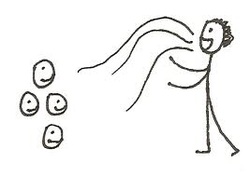 A man had been imprisoned for a very long time. A devout man, every day he prayed intensely for his freedom. Many years passed, until one morning the jailer arrived at his cell carrying a set of keys. Removing one from his ring, the jailer set it inside the cell, and said to the prisoner, "I think this is what you have been praying for all this years." Wide-eyed, the man gazed down to the floor at the single key and trembling, took it in his hand. Glancing slowly at first to his right, and then his left, he spotted a small crevice in the wall of the cell. Lovingly and with great intention he picked up the key, placed it into the crevice, and began to pray to the key. (Retold by R' Mark Novak - origin unknown - please let me kmow if you have a source) ******************* My late rebbe, R' Zalman Schacter-Shalomi, zt"l, was a master storyteller. He taught: "a good story is one where the mind surprises the heart". "A Year of Stories" is dedicated to his memory. I invite you to forward these stories so that they find their way into the hearts of other tellers and listeners. ******************* A personal note: When a storyteller follows up a story by telling the listener what it means, my heart sinks and my mind withdraws. I leave it to you, gentle reader, to place these stories into the context of your personal journey, gleaning whatever meaning or interpretation resonates within. 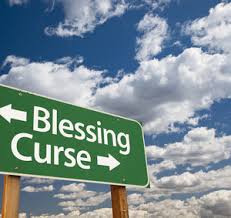 My late rebbe, R' Zalman Schacter-Shalomi, zt"l, was a master storyteller. He taught: "a good story is one where the mind surprises the heart". With that in mind I hope to post some stories in the coming months, perhaps even some told by Reb Zalman, in which the mind surprises the heart. The following story is a folk tale. To the best of my knowledge Reb Zalman did not tell it. I share it with you on in honor of his memory. Make sure you read to the end, to see just how close to home a tale can be. Long ago in a village in northern China, there lived a man who owned a magnificent horse. So beautiful was this horse that people came from miles around just to admire it. They told him he was blessed to own such a horse. "Perhaps," he said. "But what seems like a blessing may be a curse." One day, the horse ran off. It was gone. People came to say how sorry they were for his bad luck. "Perhaps," he said. "But what seems like a curse may be a blessing." A few weeks later, the horse returned, and it was not alone. It was followed by 21 wild horses. By the law of the land, they became his property. He was rich with horses. His neighbors came to congratulate him on his good fortune. "Truly," they said, "you have been blessed." "Perhaps. But what seems like a blessing may be a curse." Shortly after that his son-his only son- tried to ride one of the wild horses. He was thrown from it and broke his leg. The man's neighbors came to say how sorry they were. Surely, he had been cursed. "Perhaps," he said. "But what seems like a curse may be a blessing." A week later, the king came through that village, drafting every able-bodied young man for a war against the people of the north. It was horrible war. Everyone who went from the village was killed. Only that man's son survived, because of his broken leg. To this day, in that village, they say, "what seems like a blessing may be a curse. What seems like a curse may be a blessing." Now the second story, which is eerily similar to this one. My son Zachary, 28 is an avid mountain climber, as well as a damn good skiier. He earns his living as an Israeli tour guide, shuttling back and forth between the US for his passions and Israel for his parnassa. This past winter he was climbing in Montana when a sudden avalanche swept him and his climbing partner off the mountain, tumbling who knows how many feet below. Zack was buried under the snow, still tethered, luckily, to his partner, who unharmed, managed to keep his wits about him. He dug Zack out of the snow, finding him drifting in and out of consciousness, having suffered a concussion. Two other climbers happened by, and the three of them packed Zack onto a set of skis and for 1 1/2 hours dragged him from the accident site to the car, where they then transported him tot he hospital. Zack spent a few days in recovery with a shattered his heel and damage to his elbow. For two weeks following, maybe more, my wife Renée and I walked around the house stunned, repeating out loud, "He could have been killed, he could have been killed." Zack is back in Israel. Three weeks ago we danced together at his brother Aaron's wedding. A few days ago Zack's phone rang. It was the IDF calling him up as part of the army reserves. Israel is at war. Zack told them, "I can't come. I was in an accident a few months ago, and I wouldn't be able to carry any gear nor move as I would need to." He was told to fax the army written documentation, which he did, and several hours later he received a follow up call - he didn't need to report to duty. I asked Zack how he felt about what all had transpired. He said to me that his feelings were conflcted, that he wanted to serve his country while at the same time felt relief that he would be out of harm's way. So, you see what I meant when I said that there were 2 stories with the same ending? Truly, what seems like a curse may indeed turn out to be a blessing. Note: Thank you Zack for giving me your permission to tell your story. I trust that you will fill me in with any important details that I either left out or got entirely wrong! 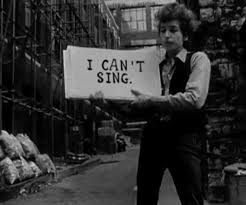 I'd like to share a beautiful teaching from Rav Kook for you to take into Shabbat with you. Rav Kook teaches that "most of a person's spiritual exhaustion and lack of inner fulfillment derives from tne fact that he is distancing himself from something he is especially qualified for by virtue of the unique characteristics of his own soul...every person must know that he is called to serve in a away that is compatible with his unique way of knowing and feeling, true to the core of his soul, and it is (there)... that he will find the riches of his life." Last week at Mindful MOSH, our monthly Jewish mindfulness gathering, Rabbi Elyssa Joy Auster guided us through the creation of personal mandalas, after which we had the opportunity to share with each other any insights we had into what we had drawn. Later, I commented that I hate to draw, and have hated to draw since childhood. Why? Because my drawings never looked like anything I do like to dabble in the margins, but drawing, that's a no. My comment opened a floodgate of memories from those present of how they had been wounded by someone, often school teachers, who had told them that they couldn't draw, that they couldn't sing, that they couldn't dance, etc. One person had this to say: "It was stunning how many of us had the experience of being told that we were "no good" at drawing or art. Mine was when 7th grade art teacher held up my work and laughed at it! And I got a D for the first time! The morning provided a nice opportunity for each of to have a bit of tikkun in that area and to hold each other gently." Another person remembered how she was asked to only move her lips while standing in the midst of her grade school choir. What I am wondering is this. My "unique way of knowing and feeling" were never mined through the experience of drawing. Are the people who tell us that we are no good at something actually angels whose job it is to guide us away from areas incompatible with our soul's journey in this lifetime? I really do not want to believe that that is true, but it does make sense in a "what seems like a curse may turn out to be a blessing" sort of way. Your thoughts? Shabbat shalom, R' Mark PS BTW, does anyone know anything about the Dylan photo that accompanies this post? 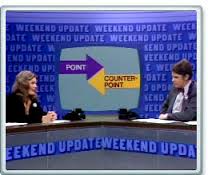 Having received many emails in response to my original post, and having spoken to others who read the post, it is clear that this conversation resonates for those of us who wrestle with our image and relationship to G!d. Evan wrote me a response which I would life to share with you, most importantly to raise up the converation to include your voices. If you are of mind to respond in writing, I ask that you do so on the Blog itself, so that we might see what others are thinking, and to talk to one another if the situation warrants. As Evan points out in his Ok to me to post this, "if we are really community building than I think you should post this response." Thank you Evan, for that insight. ******** April 23, 2014 My turn? In case anyone is in doubt, Reb Mark and I are dear friends. We speak to each other and about each other with love. And if you have been to Minyan Oneg Shabbat, you know that Mark always invites us to participate in ways and at times that one might never see in another synagogue. And I may have taken that license too far and I have apologized to Mark and I extend that apology to all of you as well. Mark, to my ear, has rejected that apology and was enlivened by the challenge and found value in the “makhloket”. (Mark's note: In a subsequent e-mail to Evan, I made it clear that my post was in no way a rejection of his apology, but rather an attempt to reconcile our different viewpoints. Whether that can be accomplished is still up in the air) What I tried to convey in the moment, was something about the quality of an Aliyah – coming to Torah to say a Blessing over Torah, to God, with our Souls. The Blessing sanctifies the moment and unwraps or illuminates the kedusha, the holiness. So when we are called to Torah in this holy moment, we honor God and Torah, in my mind, with a sense of yirah/awe/fear. I would not come before a sovereign or a parent with my grudges or complaints or disgruntlement as my first foot forward. While I can’t leave myself behind, I can’t expect grace, compassion, and goodness to ensue if I am not willing to start off with a an approach that entices grace, compassion and goodness. When Mark crafted his Aliyah, his calling up to the Torah (Mark's note: Minyan Oneg Shabbat follows the Jewish Renewal practice of setting an intention before each reading through which people in the kahal are invited by the Torah reading itself to give honor the Torah. In this way more than one person can be moved to respond to the call of any one aliyah) he pointed out the Rabbinic tailoring of the text, so that we call upon Adonai the God of Compassion but stop before we get to the Adonai of retribution. In calling us to Torah, I heard Mark to invite us to bring up our negative reaction to the language that was retributive. I heard, and in my hearing there was certainly some filtering or mishearing, that Mark’s words could mean that we come to Torah to say we honor only the God of mercy and loving kindness but not the God of retribution. I had hoped to convey that we don’t get to pick and choose our God, in the sense that the God of all, heaven and earth, good and evil, is the God we address when we step forward to Torah. So I ask you, which do you think would be most effective in a moment of kedushah standing before Torah: Hey You, God, what do you mean you want to mete out punishment to the next generations; what kind of shmendrick are you? OR God of mercy and compassion, may we together create a world where no one feels that the sins of their ancestors has been levied upon them – when we clean up our environment so that future generations live safely on this beautiful planet, when we cease fighting so there is no more war, when each of us cares for the other as much as we care for ourselves so that love begets love. Some will disagree with me and say that it is okay to have an Aliyah to Torah inviting someone to bring forward their frustration, anger, or hurt. In my understanding, I bring my whole self to Torah in a way that honors God and the relationship I want to have with God as well as take the holiness of the moment as an opportunity to offer up what I can so that we may all draw down more love, mercy and kindness. I can be angry with God, but my concern was about time and place. The exalted Rabbi Levi Yitzchak of Berditchev was known for ascending the Bimah on the High Holidays to confront God with his complaints about how the Jewish people had suffered in the early 19th Century. He did so with a deep attachment to God’s love, mercy and blessings; but cajoling God nonetheless to be gracious to God’s people Israel. So clearly, there is support in Levi Yitchak’s legacy for both Mark’s invitation and my concern about positioning. Mark’s Aliyah brought poignancy and urgency to the Torah being read. He implored us to deepen our relationship with God by reading fully and considering deeply the full text before us. I had only cautioned him, I had hoped, so that in ascending to kiss the Torah, those who would offer blessings did so in a manner befitting God and the holiness of an Aliyah. (Mark's note: Thank you Evan. Thoughts anyone?) 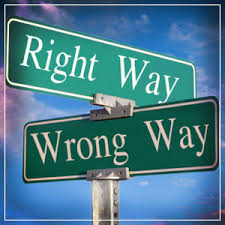 Shalom my friends I 'd like to briefly address an interaction that occurred yesterday during Minyan MOSH between me and my friend, erev rav (on the cusp of Rabbi) Evan Krame. This may be of interest even if you were not one of the 20 sweet souls who were present. I presented a kavannah based upon the rabbinic decision to edit the end of the section of the 13 attributes (Exodus 34:6-7), an edit which makes it more palatable for us to chant these words on the three pilgimage festivals as well as the high holidays. The change leaves out the end of the sentence, where G!d says, "yet He does not remit all punishment, but visits the iniquity of parentd upon children and children's children, upon the third and fourth generation." Admittedly, including these words after chanting "a G!d compassionate and gracious, slow to anger, abounding in kindness and faithfulness, extending kindness to the thousandth generation, forgiving iniquity, transgression, and sin", would be a difficult reality and backdrop to pray under. There is a similar rabbinic edit in the text of Isaiah (45:7) that we davven every morning, from the original text, "I make peace and create evil/bad/woe" to "I make peace and create everything." Another softening of the reality. Evan took me to task saying that "we can't choose the G!d that we want." In theory I agree with him, but in practice, I tend to agree with the rabbis impulse that recognizes that on occasion, we can choose the aspect(s) of G!d that serve(s) to strengthen and support us. Now, whether you agree or disagree with the manner in which Evan's challenge was presented, I would like to direct us to two rabbincal responses that may help in viewing our discussion. First, remember that the Talmud is replete with rabbinic disagreements. The underlying understanding of competing voices is "eylu v'eylu divre Elohim Hayim", "these AND these are the words of the living G-d". In this way, Jewish wisdom never utilizes a zero-sum game, one which says that if I'm right, then you must be wrong. Rather, it seeks to embrace that which seems to be opposite in order to leave room for multiple and oftentimes divergent understandings of the same phenomena. In that way, minority opinions are recognized as potential majority opinions at some time in the future. Secondly, regarding the issue of whether or not we can choose an image of G!d that is easier for each of us as individuals to cling to/yearn for, the Talmud explicitly teaches (Berachot 54a) חיב אדם לברך על הרעה כשם שמברך על הטובה: A person is obligated to bless G!d for the the bad just as he blesses G!d for the good." My sense is that this is an invitation into a deep state of equanimity, that sense of calmness and emotional stability that comes with breathing into, most especially in times of trouble, the truth that "eylu v'eylu", this too (the "bad") is also life. And, as I mentioned yesterday, what seems like a blessing might be a curse, and what seems like a curse, may be a blessing. In the end, it is not whose argument is correc, mine or Evan's, but rather it is incumbant on us to listen for the truth calling out from each side. May all of our arguments be לשם השמים, for the sake of heaven. Blessings for a continued sweet and meaningful Pesach. R' Mark MinyanOnegShabbat.org MinyanOnegShabbat@gmail.com Rabbi Mark Novak 202-362-3270 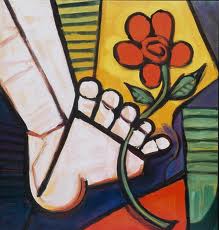 I have been very busy which is why I have not posted anything since, gulp, November? I am not going to use any excuses - not my back surgery, not my trip to Colorado, not my 2 weeks in bed "I feel like I'm going to die" bout with the flu, not my mother's small stroke and her aphasia. No excuses. What brought me back to the writer's desk is pretty darn funny. In fact, it made me and Renée laugh out loud for several minutes - all at my expense. I am sure that you have experienced a similar self inflicted wound at some point in your life, and I'd love to hear your story so I can laugh at someone other than myself! I drive on Shabbat, but only under certain conditions, which are either to drive to a friend's house for Shabbat dinner or to drive to synagogue. When I do either I first remove the following things that I keep in my wallet - my license, my registration, my auto club card, and my insurance card. By doing so I create a fence around my joy of Shabbat by not carrying money or credit cards. But since I do drive, I am prepared "just in case." So...last Shabbat morning I drove my car to the the Chevy Chase Presbyterian Church where my community, Minyan Oneg Shabbat, holds its Shabbat morning gatherings. When I lead services, I do not like to have anything in my pockets. I find it can be a source of distraction, so last Shabbat morning I removed what was in my pocket - that is, all of the things I had removed earlier from my wallet and placed into my pocket. Now when I am playing with my band I usually put these things in one of the small bags that I keep my microphones in. But this morning I was earing a "different kippah, that of "Rabbi Mark", not "bandleader Mark", and so, where to put the things in my pocket? I looked around and put them in the first thing that I saw, which were my shoes, which I usualy do not remove but on this Shabbat morning, in anticipation of doing some movement work, I had. And so, guess where I put everything for safekeeping? You guessed it, in my left shoe. Isn't that where you would have put your things? After our morning of meditation and mindfulness work I shmoozed with the people who had come, one of whom asked if he could borrow a book I had brought with me. I said yes, and then I packed up my things, put on my shoes, and drove home. But when I arrived home I realized that I didn't have the things I had put in my pocket, where were they? I was certain that I had put them in the book that I had loaned out, but no, I contacted Andrew who checked and informed me, "sorry, not in there". But I had memory of putting the things in a book, and so I scoured the other books I had brought with me that morning. Nothing. I went back to the church, retracing my steps along the way. Nothing. I waited a few days hoping the things would reappear. Nothing. Now I had to bite the bullet, and order a new driver's license, registration, etc. During the interim I had developed a pain in my foot, my left foot. How I had hurt myself I had no clue, but my foot hurt, a lot, and still does. And so yesterday, when I went to put on my shoes - the same ones that I had worn to the church on Shabbat morning, the same ones I had worn to walk to the store on Sunday, and then to the movies on Tuesday - when I looked down to pick up my left shoe I screeched and was kncked to the floor with laughter. Renée came over to see what I was hysterical about, and when I showed her all the things I had put in my shoe and forgotten about, the same shoe I had worn for 3 subsequent days after putting the things in there without noticing, we had a really good laugh. LIke I said, I am still limping. I feel a little bit like Jacob after his wrestling with the angel and he walked away with a limp from the encounter. Surely, my driver's license was in this place and I, I did not know! What's the lesson here? Not I'm not supposed to eat from a certain section of my shoes from now on? OK, now come clean, hasn't something like this happened to you? And what do you make of the fact that it was after a morning of Jewish mindfulness pratice that I failed to notice that my shoes were not as comfortable as they had been before? Renée suggests that next time I put the things in my coat, and that is exactly what I plan to do - and then leave the coat home. Now, where are my keys? 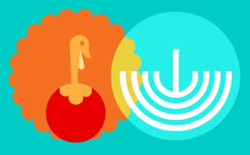 Whenever I meet with a new student one of the things I make sure to tell her/him during our first session is "I am going to learn a lot more than you are." More often than not this elicits a nonverbal facial response "Are you kidding me?" But I kid you not, as all teachers know, this is the truth. Pirkei Avot (Ethics of the Sages) 1:6 teaches, "עשה לך רב וקנה לך חבר’, "Get yourself a teacher, secure for yourself a friend". Rabbi Rami Shapiro gets to the heart of it for me, commenting "A teacher shares what she knows; a friend helps clarify what you know" And that is what happened yesterday in my study session with Raviv, with whom I am studying in preparation for her becoming bat mitzvah next July (we are studying via Skype, she is living in Brazil for two years with her family) At some point in our conversation I wished her a Happy Thanksgivvikuh, and wondered if she would be celebrating both holidays in Brazil. She told me that they indeed were planning on celebrating both Thansgiving and Hanukkah, but that she prefers referring to it as Chanukiving, with the Jewish holiday being the first part of the mash. Raviv is right. In our impulse to recognize both our Americna and Jewish claims we have erred, and in doing so have sent the wrong message to ourselves and to our Jewish-American friends. (Note that we rarely refer to ourselves as "American-Jewish") In a blog post by my friend and colleague Rabbi Mindy Portnoy, she writes, "This year, the entire eight days of Chanukah stand firmly on their own, a separate ritual, metaphorically marking a separate people and tradition, which might not have survived without those brave, controversial, and (yes!) fiercely anti-Hellenistic Maccabees and the creative rabbinic spiritual interpretative layer of a tiny vial of oil. Do we really have to transform these miracles into an over-hyped, commercialized Thanksgivvikuh?" The first time I heard the phrase Thanksgivvikuh it made me laugh - how clever, how creative. And what a great opportunity for a good drash - the quest for religious freedom, how food plays an important part in ritual in helping to raise a secular milestone to the higher level of sanctity. But Raviv is right. Jews have a older narrative, and there is power in our particularism that needs to honored first. America is not the melting pot in which we lose our identities, but one in which we re-imagine ourselves and rejoice in it through the lens of tradition. This past week I was sent a joke that at first made me cringe. Mr. Christian chastises his next door neighbor Mr. Cohen: 'Your son is not going near my kid again; he just has no respect for us and our religion!' 'What's the matter; what did he do?' inquired Mr. Cohen. 'I'll tell you'. said Mr. Christian in a rage. 'He saw our Christmas tree and started making fun.' Really, what did he say?' continued Mr. Cohen. Mr. Christian said, 'He saw our tree and started asking all sorts of ridiculous questions - which kinds of pine trees can be used for a Christmas tree? What's the minimum required height? How close to the window does it need to be? Do too many decorations render it unfit? What if it's under a neighbor's balcony?!' At first, my reaction was probably like yours - oy, the Jews, we're so wrapped up in halacha, the proper way to do things, that we lose sight of the spirit of the thing and suck all the joy out of the moment. There is some truth to that. But isn't is also true that "G!d is in the details"? That the intention with which we do something cannot be divorced from the process of what we do? In fact, sometimes it is more important. (i.e. "It's not what you said, it's the way you said it") Chanukiving? Thanksgivvikuh? The way we say it is important, because it says so much about how we see our Jewish identity within the broader context of living in the "land of the free". And besides, Chanukiving might be read as חנו-giving, give with grace. I kinda like that. It is something that I aspire to do. So thanks Raviv, for being my teacher and helping to clarify what I know. (and an early) Happy Hanukkah to everyone. Shabbat Shalom, R' Mark  We still get the newspaper delivered every day. I have been lobbying lately for subscribing to only the digital edition of the paper in order to save the lives of a few trees (OMG, could I be reading newspapers made from the same trees that the JNF planted in my name when I was in Hebrew school??) In any case, my daughter Kaziah nixed the idea, because it would make it far too difficult and far too time consuming for her to read the 2 pages of comics that she consumes in the Washington Post every day. And my wife Renée likes to cut out recipes from the Food section, which let's face it, cannot be done on a computer regardless of its' cut and paste options. I must admit that I need the paper too. Otherwise, I couldn't say that we "get the paper" every day and, I wouldn't have the obituaries to read. Does anyone know whether it is true or an urban myth that would-be renters in NYC read the obits and then pounce on the apartments that the now deceased left unoccupied? Can anyone confirm or put to rest this idle roomer? (sic, pun intended, or sick pun, intended) Either way, the obits hold a certain fascination for me. And becuase of what what published in today's paper, I got to meet three people whose lives would otherwise have gone unnoticed and unappreciated by yours truly. What makes it all the more lovely is that all three were music lovers. The picture above is of Lambert Bartak (pretty darn close to Bartok don't you think?) who died last Tuesday, November 5th, at the age of 94. For over a half century Mr. Bartak was the organist at Omaha's Rosenblatt Stadium, entertaining the crowds for the College World Series. Bartak also played the organ for minor league baseball's Omaha Royals from 1973 to 2002. In 1988, he was ejected from a game when he played the theme song from "The Mickey Mouse Club" during an onfield argument between the Royals' manager and an umpire over a call. Talk about the power of music! 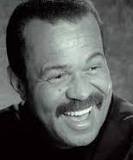 Al Johnson died on October 26. He was only 65 (Uh-oh, I just turned 60 last week), and I wonder if any of you recall his 1960's rhythm and blues vocal group called the Unifics, because I sure don't. But Mr. Johnson went on to produce and arrange for Roberta Flack, Peabo Bryson, and Jean Carne. I just love the truth of what he had to say about love songs: "For something that causes so much pleasure, love causes a whole lot of pain. Love songs allow you to experience the emotion without having to do the roadwork or, if you have been through the mill, make you feel that it was somehow for a worthy cause." I'll say. 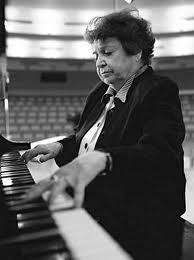 The third person I had the privilege to meet today is Chana Mlotek, who died at her home in the Bronx on November 4. Music archivist at YIVO, she was an impassioned collector of Yiddish songs. Isaac Beshavis Singer once called Chana and her husband Joseph, "the Sherlock Holmeses of Yiddish folk songs." In 1970 the couple began writing a column in the Jewish Daily Forward called "Perl Fun Der Yiddishe Poezie" ("Pearls of Yiddish Poetry") One section of their column, "Readers Recall Songs," asked readers to submit small portions of songs they remembered from their youth. The Mloteks would then research and identify these songs and write about them. One of the most memorable letters came from a man who had been in a concentration camp. A boy there sang, "My Yiddishe Mame," and the Nazi officer was so moved that he told the guard to give the Jews another bowl of soup. A week after the letter was published in the column, a writer wrote that he was the boy who sang the sentimental song, and a week after that, another letter came from someone who said, "I was there too." As an enthomusicologist and folklorist, Chana said that songs were powerful stimulants to retrospection. "There's a song everybody loves." She wrote her first research paper on a song called, "The Beard" in which a wife asks her husband why he cut off his beard because she no longer recognizes him. "I found it to be a poem by Mikhl Gordon from 1868," Chana said, "It went through many different translations and melodies. When a songs is transmitted orally like that, it becomes folkloric." (BTW, my family folklore has it that many years ago my father-in-law came home having shaved off his beard. My late mother-in-law told him, "If you shave it again, don't bother coming home") Lambert Bartak, Al Johnson, Chana Mlotek and my late mother-in-law Randy Brachfeld. May their memories be for a blessing.  The American City Diner is located on Connecticut Ave, a few blocks from my home in Washington, DC. Owned by Jeffrey Gildenhorn, a native-born Washingtonian, the diner requently has something noteworthy to say on its billboard. Sometimes the message is a political one that speaks to the countless politicos who drive by every day ("The Future is Now, Reach Across the Aisle"), or more diner-like ones ("Breakfast all Day, Birthday Parties"). The message to the left that appeared a few weeks ago ("Enjoy Shabbat Here") drew my attention for obvious reasons and got me to thinking, which my wife Renée likes to say, is always a dangerous thing. I am going to ask you for feedback on this one, because I need your help to think this through. You may be aware of the recent Pew research report,which depending upon your reading of it, represents: 1) a confirmation of the decline of Amercian Judaism 2) a flawed survey, or 3) an opportunity to reach out to Jews who reject denominational affiliations, yet express faith ("I'm spiritual but not religious") and pride in being Jewish. Because I'm a hopeful kind of guy, I am most drawn to the third conclusion. In contrast to the Jack Werthheimer School of Doom and Gloom (note: can't we embrace BOTH global consciousness and tribal allegiances?), my impulse is to rest assured that 4000 years of evolution from Biblical Judaism to Rabbinic Judaism to ?? is foundation enough to withstand all the concerns of what modernity presents us with. Here's my question. Who are the Jews that are enjoying Shabbat at the American City Diner and what does being Jewish mean to them? Some, I surmise, are Reform Jews, for whom spending money on Shabbat does not present an issue. For that matter, let's be honest and assume that some Conservative (with a big "C") Jews are eating there as well. What about the rest? Are some of them unaffiliated non-shul goers who fall into the above third category? "Spiritual but not religious", who are among the 94% of the Jews surveyed who expressed pride in being Jewish. Here's my idea, and it is based on successful models of "keruv", of Jewish outreach based on going to where the people are (i.e. Chabad rabbis' work on college campuses, which is how my rebbe Zalman Schacter-Shalomi and Shlomo Carlebach were deployed in the 1950's) The idea is to approach the owner Jeffrey Gildenhorn with the possibility of displaying a sign that reads: "Enjoy Shabbat Here - The Rabbi is In". Perhaps he might set aside a section of the restaurant on Shabbat afternoon (there goes my nap) for people to drop in, eat, shmooze, and talk about what it means to be a Jew. To pose some questions - How can we build a Jewish future together? Is there importance in securing a Jewish future? What questions would you ask? And how might I approach Jeffrey Gildenhron with this idea? If the Pew people had talked to you, what woukd you have wnated them to know? When replying, please do so on the website (as well as to me offline if you wish) so others can see your response. Thank you in advance for your thoughts and suggestons. In the tradiiton of Avraham Avinu, who according to the midrash interrupted his visit from G!d in this week's parsha to attend to the needs of hungry travellers, I wish you Shabbat Shalom. And if you happen to be in the DC area, "Enjoy Shabbat Here". (Or for that matter "asher hu sham" - wherever you may be) First Base
Setting: The stage is in complete darkness. A pinspot shines center stage. Voice #1 (an ethereal voice from emanates all corners of the theater): Are you proud to be a Jew? Voice #2 (from darkened stage): Yes Voice #1: Did you become Bar Mitzvah? Voice #2: No Voice #1: Do you celebrate the holy days? Voice #2: No. Voice #1: The what are you so proud of? Voice #2: That I am a role model for young Jewish kids. Voice #1: But you are a cheater and an unapologetic wrongdoer. Voice #2: Voice #1: You need to ask for forgiveness. Voice #2: I've already done that. Voice #1: Yes, but you have to really mean it. Voice #2: I am genuinely sorry for what I have done. (pause) How's that? Voice #1: Works for me. But what you have done needs asking for forgiveness from those you have hurt. This is not a sin Beyn Adam v'Makom, but rather Beyn Adam V'chavero. Voice #2: Voice #1: Sorry, I should have known that you wouldn't get that reference... you need to do teshuva. Voice #2: What do I need to do to a shoe? Voice #1: T'-shu-va...you need to apologize to the people you have hurt, not me. And it's the perfect time of year to do teshuva. Voice #2: Perfect time of year? You're right about that! Pennant races, the playoffs... Voice #1: Oy, I need this like a loch en cup. Listen my friend, this is taking much more of my precious time then I had planned, which is pretty impressive, since to me a second is like a hundred million years. (He laughs) Voice #2: What the...? Voice #1: (as an aside) Gevalt, he doesn't even know our jokes! Here's what I suggest - you'll talk to a rabbi. I'll set up a meeting with you and one of the greatest rabbis who ever lived, The Rambam. Why didn't I think of that before? Mr. Braun, go and learn. As for me, I'm going to vacate this space and do some tzimtzum. Voice #2: Tzim...tzim...Tzimmes! I know what THAT is! Voice #1: (as an aside) Maybe there's hope for this child yet. Second Base Setting: Rambam's study - Two chairs are set facing each other, angled towards the audience Rambam: What is your Hebrew name young man? RanBran: Uh, I don't know sir. Rambam: You don't know or you don't have one. RanBran: I don't think that I have one. I don't know. Rambam: OK, then we'll give you one when the time is right. Now, tell me why you have you come to see me? You have a reputation for being powerful, but travelling 900 years into the past is pretty impressive by any standards. OK, let's get started, I only get 3 hours of sleep a night, and my time is precious. RanBran: I was told that I need to shoe something? Rambam: Teshuva. RanBran: Yeah, that's it, teshuva.....what's teshuva? Rambam: Hmmm... Hillel might have been able to distill it down to 140 characters, but I'm going to have to give you a longer version. RanBran: I have nothing but time, 65 games worth. Rambam: What was your sin? RanBran: I got nailed for taking PEDs. (Rambam looks at him quizically) Performance Enhancing Drugs - PED's are a banned substance in my profession. Rambam: You're a gigolo? RanBran: (shocked) No! A baseball player, and a pretty good one too. Have you ever heard of baseball? Haven't you ever heard of me? Rambam: Baseball? Of course, for the Torah says "in the big inning.." (He winks) RanBran: Huh? Rambam: Gevalt, he doesn't even know our jokes. Voice #1: I know, I know. (Rambam nods in agreement) Rambam: And truth be told, I've never heard of you, because only the Holy One of Blessing can look into the future. Let's get to why you're here. You want to, or, anyway, you need to do teshuva, correct. RanBran: I suppose so... Rambam: Here are some ways to do it. First, you could change your name. RanBran: What? Change my name, to what? Rambam: To anything other than the one you use now. RanBran: And how does that work exactly? Rambam: It's as if to say "I am another, and I am not the same person who did those deeds." RanBran: (excited) That could work. (to self) Imagine, two busts of me in the Hall of Fame. Rambam: Well, maybe not then. This is really about the supression of ego and I might need to send you to Freud to deal with that. There is something else you could try. You could exile yourself from your place. RanBran: You mean get traded? I'm not the GM, and I like Milwaukee. Rambam: Changing places would humble you. Like we find in the Talmud, "if a person finds that an evil urge is overpowering him, he should go to a place where they don't recognize him, wear dark clothing, and wrap himself in black. RanBran: (looking dejected) I already feel like an outcast. Rambam: OK, let me suggest one more possibility. How about giving tzedakah? (RanBran looks puzzled) Charity. Giving charity would avert the severity of the decree. RanBran: You mean they might reduce the number of games I have to sit out if I give some money to charity? How much would I have to give? I lost 40% of my salary. Rambam: How much do you make RanBran: 10 million dollars a year. Rambam: (long silence)...........Mr. Braun, do you acknowledge your sin? RanBran: Yes. Rambam: Do you regret doing it? RanBran: Yes. Rambam: Do you resolve never to do it again, even if the opportunity presents itself? RanBran: Yes. Rambam: Finally, have you asked from forgiveness from those you have hurt? RanBran: Well, not exactly.... Rambam: Go do it! Third Base Setting: The RanBran's home office - The RanBran is dialing a cell phone. RanBran: Hello , I 'm trying to reach Wes Aldridge. Aldridge: This is Wes Aldridge. Who is this? RanBran: Mr Aldridge, this is Ryan Braun. I am calling all the Brewer season ticket holders to apologize and ask for your forgiveness. Aldridge: (pauses) C'mon, who is this really? RanBran: It's Ryan Braun Mr. Aldridge, and I'd like you to ask that you consider forgiving me for my actions. I am really very sorry. Aldridge: Well, if it's really you, then I must tell you Mr. Braun, that I can't do that. You cheated the game. In fact, I've packed up your memorabilia and intend to keep all of it out of the sight of my grandsons. RanBran: I'm sorry you feel that way. Mr. Aldridge, would you mind if I called you back sometime to see if you changed your mind? Aldridge: Do what you want. RanBran: Thank you for your time, I appreciate you giving me the opportunity to atone for my mistake. (He snaps his cell phone closed) Yes! Now I only have to call him back two more times and I'm home free!* Rambam and Voice #1: That he knows about??? (RanBran winks to audience) (Lights to black) * According to Jewish law, once you sincerely ask for forgiveness three times you no longer carry the burden. 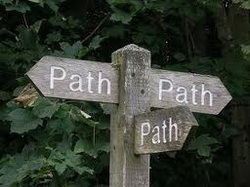 One way that I understand teshuvah is as the process through which we re-align ourselves - with our community, with G!d, and with ourselves. Every year my understanding of how to do teshuva grows and deepens. I'd like to share two teachings I am taking with me into the Yamim Noraim, the Days of Awe, which begin tomorrow evening. Two teachings intersect on what it means to re-align and return to ourselves. The first is from a likely source, Rav Abraham Isaac Kook, the first chief rabbi of the holy land. The second is from an unlikely source, Grateful Dead lyricist Robert Hunter. Rav Kook teaches: כל אדם צריך לדעת, שקרוי הוא לעבוד על פי אופן ההכרה וההרגשה המיוחד שלו, על פי שרש נשמתו... Every person must know that he is called to serve in a way that is compatible with his unique way of knowing and feeling, true to the core (root) of his soul... Beautiful. Each of us was born with a unique life to live and only we alone can accomplish what we were created to do. Rav Kook continues: חיב אדם לומר בשבילי נברה העולם A person is required to say, "the world was created for me." Now this phrase from the Mishna (Sanhedrin 37a) is often translated 'the word was created for my sake', which is what is means here. But perhaps Rav Kook is engaged in some wordplay. For if we break the preposition בשבילי down to its component parts, noticing that the word שביל, meaning path, is embedded within, we could translate it as "along the path that is mine" (and mine alone). How liberating. The world was created with my path already in it, and there are things along that path that only I am able to rectify, including of course, myself. When we recognize the truth of this, Rav Kook teaches that "this humble greatness validates the person and leads him to the higher wholeness which stands and awaits him, and as he takes steps on this confident way of life, on his own particular path, on his own unique 'route of the righteous ones', he will be filled with life courage and spiritual joy, and G!d-light will be revealed to him." My friend and colleague Rabbi Nadya Gross has this little gem next to the photo on her Skype ID, "Be yourself. Everyone else is already taken." Each of us has our own unique calling, our own unique path. Wow, you mean that I do not have to compare myself to the accomplishments and life journies of others. Of course, living life like that is a challenge. A few mornings ago during my daily davvenen (divining?), I couldn't help but notice a finch hovering above the sunflowers in my garden. When the finch took flight into the distance, I wondered, "How does she know where to go?" Indeed, how do I know where to go? One way is through my daily spiritual practice, which if I am so blessed puts me in a state of receptivity to guidance from the "true core of my soul", guidance that is intended for me and me alone. When I follow that guidance, I am doing teshuvah, re-aligning myself with what I sense to have been G!d's dream for me from the beginning. Perhaps before the beginning. Has Rav Kook's name ever been mentioned in the same breath as Robert Hunter and The Grateful Dead? This could be a first. These lyrics are from the song Ripple, written by Robert Hunter, which lovingly express some of Rav Kook's mystical teachings, clothed in a melody by Jerry Garcia as sweet as apples and honey. Enjoy. Reach out your hand if your cup be empty If your cup is full may it be again Let it be known there is a fountain That was not made by the hands of man. There is a road, no simple highway Between the dawn and the dark of night And if you go no one may follow That path is for your steps alone. (Everybody sing: lai la lai lai lai...) Nice...the song ends with a niggun! Shana tovah U'm'tukah - a sweet and song-filled new year to you. Much love and blessings, R' Mark  Reb Zalman has commented in the past about how he has gone to services of other faiths to see "how they get it on with their G!d." I was propelled to do just that this past Sunday (not sure why I feel it necessary to tell you that I also went to shul this past Shabbas), to share in the worship service at Chevy Chase Presbyterian Church, which is the church that generously hosts my Renewal community, Minyan Oneg Shabbat. Here is what I experienced, here is what I learned, and in some cases, here is how is differed from shul on Shabbas. * The church is within walking distance of my home. How nice is was to walk slowly on a quiet Sunday morning to a place of worship. A Jerusalem moment. * Services began promptly at 10am and ended a little after 11. Everyone was present from beginning to end (Compare to Shul - 9-12:15, with the majority of people arriving during the Torah service, except of course for the family and non-Jewish friends of the bar mitzvah - is that your shul too? ) From 10 to 11 we experienced: 2 Bach cello pieces; a story told by one of the ministers to the children; a sermon by Reverend Molly Blythe Teichert; community singing; an invitation for people to greet each other; a shout out to me by name from Reverend Molly, where she joyously mentioned that my community met at their church; offerings of "good news"; offerings from people in need of prayers for either them or others; people greeting me as I entered and as I departed. • The morning was sung and spoken in English. I was hoping for some Latin, but I knew that I would have needed to attend a different church for that. Not that I have experienced it more than once or twice, but Latin lends a sense of mystery to a church service. Does Hebrew have the same sense of mystery for Jews who don't understand the language? That's one thing I love about Renewal services - the use of recently written liturgy that combines traditional text with English text that invites entrée into worship. As for singing Mimkomo during Musaf for the 1000th time to the melody of Erev Shel Shoshanim...don't get me started. * After worship I was greeted warmly by a woman whose last name was Cohen. She asked if I had a card. (I think to myself, "Hey it's not Shabbas, I have cards with me! They're in my wallet that I have with me, and I can give her one!) She wondered aloud if her Jewish husband might be interested in my community. * Reverend Molly preached about worship and justice, and how to know when one or both are real and authentic. She reflected on her work in South Africa, her work in the anti-apartheid movement, and spoke about worship being true worship only when it inspires to correct injustice in the world. She quoted from Isaiah, "What need have I of all your sacrifices?" says the Lord...learn to do good, devote yourselves to justice; aid the wronged, uphold the rights of the orphan, defend the cause of the widow...be your sins like crimson, they can turn snow-white." Her sermon closely tracked the theme of the Haftarah on Yom Kippur, "Is this the fast that I desire?...let the oppressed go free, share your bread with the hungry." I wondered if she chose the theme because of Elul and the approaching Jewish Holy Days. No - she chose the theme because of her passion. * I appreciated looking up at the hymnal board to read the song number that we would be singing. I easily navigated my way through the book to find each hymn and joined in. I have to admit that it reminded of elementary school, where, leading up to Christmas in the early 1960's, we sang lots of songs with Jesus' name in it. If you're Jewish and if you're around my age and went to public school, you also stopped singing when the J or C word appeared. I skipped over them this time as well.* Several times during worship I was moved to tears. Outside of when I davven with my Renewal chevra, that never happens for me in synagogue. One exception. When we read V'zot Ha'bracha, Devarim, Chapter 34:1-12. But that's just me. . 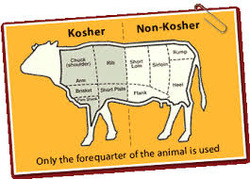 I have two stories to tell. The first is about my decision several years ago to wear my kippah all the time, and the second is about my decision several weeks ago to eat chicken that did not have a kosher hecksher. ••••••••••••••••••••••••••••••••••••••••••••••••••• One of the courses I took during my rabbinical studies was a retreat with Torah scholar Aviva Zornberg at Isabella Freeedman. Driving north from DC my traveling companion and I decided to take a break for lunch, and I suggested that the upper west side of Manhattan offered lots of choices, both kosher and not, and stopping there wouldn't take us out of the way. So that's what we did. We opted for a Sushi restaurant and settled into seats on their outdoor patio. At this time in my spiritual formation I was experimenting with wearing my kippah all the time. To not remove my kippah at a non-hekshered restaurants was the "last frontier" for this particularly persoanl test of my Jewish identity. One reason I had been given NOT to wear a kippah was over the issue of "marit ayin", which specifically forbids even walking into a non-kosher retaurant, and, for a more rigorously halachically observant Jew than I, not even to enter in order to use the restroom. The logic? Partly because if someone (read: orthodox Jew) saw me eating at a restaurant with a kippah, his assumption might be that it was, of course, a kosher restaurant! Aha, but here's the rub. I'm a Jew, (and IMHO a pretty good representative of the tribe), and right now I was wearing a kippah in a non certified-kosher restaurant (but eating, BTW, only food that is kosher). As I said, at this time in my life I was concerned with the issue of marit ayin, but what happened next cured me of that worry. As we sat eating on the outdoor patio, a van pulled up at the corner. Out of the van stepped a young Chasid dressed in black - jacket, shoes, hat, the whole nine yards - who walked directly to the door of our restaurant and began a conversation with the hostess. A few moments passed. The hostess shook her head "no", the young Chasid nodded a few times "yes", that he understood, and then turned around and made his way back to the van. What had happened was clear. The van had passed our restaurant and the men had noticed me eating with a kippah on. They thought to themselves, "A new kosher Sushi restaurant? Let's check it out". And that's what they did. And what they found was a restaurant not kosher to their standards. To guess what if anything they thought about me would be pure conjecture. To this day I wear my kippah all the time, but to be completely honest, when I eat in restaurants, I try to seat myself in such a way that my kippah is seen by as few people as possible. Perhaps I am not completely liberated from previous notions. •••••••••••••••••••••••••••••••••••••••••••••••••••••••••••••••••••••••••••••••••••• A few weeks ago I spent 3 days with my college roommate Izzy (formerly Bobby), who I had not seen for perhaps 25 years. He lives with his wife in Vermont on a beautiful piece of property that they renovated themselves, complete with a clear trout-filled running stream, chickens, cows, and lambs. All of the animals are bred for consumption, which he slaughters and packages with his own hands. Izzy and I had had very little contact between college and now. Can't really explain why, but as people do, we grew apart. So it was with some distance between us that over the last few years we started communicating via e-mail. He would send me a link to an article he thought may interest me. I would send him news of my family, about my becoming a rabbi. When I realized this spring that I would not be far from his home when I made my trek to the ALEPH kallah, I asked if I could come for a visit. He said yes. He asked is I had any dietary restrictions. I told him that my only restriction was that i didn't eat non-Kosher meat. He said, "that might be a problem". I understood why. The dining room table is a holy place where important ritual takes place, where we play host to our guests with delectables lovingly and intentionally prepared. I knew that he would be hurt if I did not partake of the meat he had "grown" himself, but my spiritual practice is to eat intentionally, which includes eating only kosher meat (both in and out of the house, as opposed to the manner in which I grew up - sound familiar? Did you have a separate set of plates and utensils for Chinese that you kept in the basement?) In the days leading up to visiting Izzy I discussed this with friends and colleagues. Before my contacting Izzy I had been contemplating whether or not I might start eating free-range, organic meat that was not heckshered. Rethinking my eating habits had been calling me ever since reading Postville. The entire question of what it means to "be kosher" is front and center for many Jews who have seldom given a second thought to what they consume and the manner in which both workers and animals are treated. With that in the background I visted my old friend Izzy. Any tension that had arisen around the issue of food had dissipated. On the way to his home I had purchased up a piece of salmon and he had already planned to make an eggplant parmesan. But I was still wrestling with what I would do, what my neshama was calling me to do. In a conversation with R' Victor Gross he shared with me that Reb Zalman once said to him that sometimes you need to "test the soul" in order to see if something works or not. I asked Izzy how he slaughtered his animals. He told me that he meditates a few days beforehand on what he about to do, later asking the animals for their permission, and ultimately thanking them for giving their lives for his consumption. I was moved by his intentionality. "How do you do the slaughtering?" I asked. He told me that with the cows he shoots them in the head, and then slits their throat. I knew immediately that I would not be eating that night's London broil. Slaughtering the chickens was different, a single thrust of a very sharp knife. The following night I ate what was perhaps the most delicious chicken I have ever had, prepared with love and great delight by my old friend. I wondered - how would I react after eating - would I feel guilty, nauseous, satiated, something else? It is three weeks since that night. I have nary reflected on eating my friend's home grown chicken. I wondered about that. I asked a friend why she thought I hadn't reacted with any need to talk about the experience, to parse out what had happened and what I might do in the future. She told me something amazingly simple, something that had never come to mind. That it wasn't about me. That I had eaten my friend's food out of love, and out of respect for our relationship. That hit home, and tears of joy welled up in my eyes. The question remains, whose kosher is it anyway? What both my kippah and my friend have taught me, is that if we do what we do is out of love, it very well may be the most fitting of all impulses.  Tonight marks the beginning of Tisha B'Av, the 9th day of the month of Av. It is a day of fasting and lament, in which we recall the darkest days of Jewish history, including the destruction of both 1st and 2nd Temples, the expulsion from Spain in 1492, and the sin of the spies, who brought fear to the wandering Israelites instead of hope and promise. It is instructive that following Tisha B'Av we read parshat Va'etchanan, in which we chant our daily mantra - Shma Yisrael Adonai Eloheynu Adonai Echad - the very essence of hope and promise. I say the Shma twice a day, morning and night, always among my last words before drifting off to sleep. Ancient words of surrender, of connection, and of faith. Saying the Shma does not always however have that affect on people, as I recently learned after leading a Ma'ariv service at the Jewish Renewal Kallah. For a long time I had wanted to lead a congregation in its recitation of the Shma as I did at Kallah. I asked everyone to begin saying the words very, very quietly, attending to the words being spoken by his/her neighbor. They were to slowly get louder and louder, listening to each other, until together everyone's voices reached a crescendo, at which point their voices would subside, like an ocean's ebb and flow, until the last person's voice trailed off. It worked beautifully, just the way I had heard it in my mind. It devestated at least two members of the kahal. The next day two women approached me at separate times to tell me about their experience. Both had had the same experience, a powerful one which they never wanted to repeat again. While chanting the Shma rthe night before, they found themselves in a death camp, slowly walking with others to the gas chamber, chanting, no shouting the words of the Shma together with everyone else. The shouts got louder and louder, until their voices were heard no more. I lstened, and understood that I could never again lead the recitation of the Shma in that way. Tonight and tomorrow, I will recall the unalterable destruction perpetrated throughout history on my people. It will serve for me as the starting point for the next seven weeks in preparation for Rosh HaShana and Yom Kippur. And I will begin by remembering that the six words of the Shma have had power for others throughout history that is far beyond anything that I might ever contemplate. 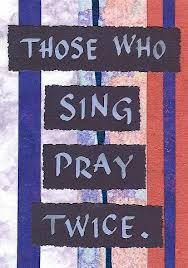 Hanging to my left on the wall in my office is this card: "Those Who Sing Pray Twice." Like most of what I am surrounded by (G!d forbid this should ever include the loved ones in my life), I take little day to day notice of. But I couldn't help gain some new insight into what this quote may mean in the light of this week's Torah portion, Parshat Chukat. The most famous instance that we find B'nai Yisrael breaking into spontaneous song is after its perilous flight from Egypt and its subsequent crossing of the sea. The Song of the Sea begins: אָז יָשִׁיר-מֹשֶׁה וּבְנֵי יִשְׂרָאֵל אֶת-הַשִּׁירָה הַזֹּאת (Exodus 15:1) Then sang Moshe, and all the Israelites with him, this song... So too in Pasrhat Chukat do we find Israel breaking into song after another act of Divine salvation, this time from the hands of the Amalekites (disguised, according to Rashi, as Cannanites):אָז יָשִׁיר יִשְׂרָאֵל, אֶת-הַשִּׁירָה הַזֹּאת (Numbers 21:17) Then did Israel sing this song....(doo-daa, doo-da) What is the connection? A line from Psalms gave me a clue: לַיהוָה הַיְשׁוּעָה עַל-עַמְּךָ בִרְכָתֶךָ סֶּלָה. (Psalms 3:9) Rescue is the Lord's! On Your people your blessing (Alter translation) The midrash on this psalm helped me understand somethng new. Midrash Tehillim unpacks this line to mean “for all the miracles you do for us it is our obligation to sing songs for you” According to the midrash then, a blessing = a song. As the card says: "Those Who Sing Pray Twice." In a more modern context, from where does spontaneous song arise? In a beautiful interview, Roseanne Cash, the daughter of the legendary musician and songwriter Johnny Cash, comments on her music writing process: "I think that when you're in that creative zone, you're tapping into the collective unconscious, and that there's a field there. I think that's the unified field, that creative vast unconsciousness full of beauty and love. And when you're in the zone, as a writer, as a painter, as a cook--any creative endeavor--you can draw on it. Sometimes I feel like the songs are already out there... It's not that way with all of them...(but) some of them are infused with the radiance of truth, and those are the ones that I think come from that unified field, from God, from what I think of as God. That doesn't mean I'm extra special, by the way. That means everyone has access to it." Collective unconscious, unified field, שמע ישראל. B'nai Yisrael breaks into song after rescue because it is for them, as it is for me, a moment in which my senses are in a heightened state of awareness. I'm more tuned in, and channel provides better reception. I'm in the zone. May we all be blessed to sing our song, whether it rise up in times of plenty or in times of trouble. And may our songs be drawn from the Infinite well, a song that in turn draws us back to our source. "Those Who Sing Pray Twice." 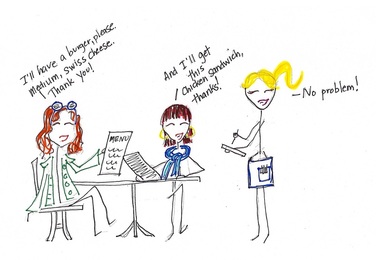 Tell me if you've heard this one before? Four guys are standing on a street corner...an American, a Russian, a Chinese man, and an Israeli... A news reporter comes up to the group and says to them: "Excuse me...What's your opinion on the meat shortage?" The American says: What's a shortage? The Russian says: What's meat? The Chinese man says: What's an opinion? The Israeli says: What's "Excuse me"?..... If you have ever been to Israel you probably really "grok" that joke. In Israel being offered a "slicha" is often followed by being pushed and shoved on the bus. Israelis live in one of the toughest neighborhoods in the world, so we might excuse them for being a little pushy. This joke came up in a discussion about the use of language, following an incident similar to the cartoon I posted. My wife, my daughter and I were with friends at a very lovely Indian restaurant. The waitress refilled my water glass. I said "thank you", to which she replied "No problem." Is it just me that finds this irksome? I like when people say "you're welcome" in response to my "thank you". I know I know, it's a generational thing, and besides, it's her job, so it really IS no problem because that's what she is supposed to be doing. There was disagreement around our dinner table, and not just from my 17 year old. As I see it, everything has become so casual - dress, conversation, behavior - resulting in the disappearance of common courtesy. When our daughter was born, my wife Renée and I decided that we'd have her refer to our friends with appropriate titles, such as Aunt Julia (not a real Aunt, just a friend) or Mr. Dov. We had neighbors that had their kids behave as such and we really liked it. But our friends were unwilling to go along, and after a while we gave up and our daughter started calling our friends by their first names. Imagine if I'd done that when I was a kid? I would have gotten such a zetz I wouldn't have known what hit me. Maybe I'm just getting old, and perhaps the language I grew up with and still prefer is simply out of date. Emily Post's great-grandaughter Cindy Senning writes the following: "The principles of respect, consideration and honesty are universal and timeless, but "manners change over time and from culture to culture." I take this to mean that the language through which our manners are articulated are subject to change, but that the priciples are universal. In Hebrew those principles are called "derech eretz". I am curious what you think about this. Do you long as I do for the days of "please' and "thank you"? If you have a comment please post it on the website at http://www.rebmarko.com/blog.html because it makes it easier to have a conversation rather than writing to me on the FB page. And if you liked this blog post.....ein b'aya. No probem.  I am always delighted when someone reacts to something that I have said with "I never knew that!" Sometimes my reaction includes a mix of astonishment and dismay. The astonishment comes from having the immediate thought, "Really? I thought everyone knew that", and the dismay from "How could that be? What a loss that you never knew that." For example, during the Minyan Oneg Shabbat study session on Leil Tikkun Shavuot (yes, it has been a while since my last post), I quoted this passage from the Talmud: "In the world to come, each of us will be called to account for all the things G!d put on earth which we refused to enjoy." This elicited an immediate response: "It says what? That we're supposed to enjoy all that life has to offer. That's Jewish? I never knew that!" The woman shared with me in private that she thought that Jews are supposed to suffer and to do without. I was both astonished and saddened that something as definingly Jewish had never been communicated to her, and if it had, she had not been able to integrate that truth into her life. Here's another example. Last week I gave a drash during which I talked about my love for gardening, and specifically talked about composting. I shared this lovely passage from Rabbi Balfour Brickner's (z"l) book Finding G!d in the Garden: "...there always seemed to be a lot of garbage. What to do with it? For years we did what most people do: we threw it out...(into) a garbage can...electric disposal. Frankly I never gave the matter a second thought. That was what one did with garbage. It was only when I began to garden that my postculinary habits changed radically. Garbage...took on new meaning for me - and new life. In fact, that is exactly what happens to it when it is used in the garden: it takes on new life. Put differently and much more to the point, what seems dead lives - again." After quoting this passage I punctuated it by saying "Mechayei HaMaytim, the One who restores life to the dead." After services a woman thanked me, saying "I've never been offered a metaphor for the phrase "Mechayei HaMeytim" that worked for me. Thank you." Mechayei HaMeytim" - the quality of the Divine as the One who restores life. Wait a moment, this woman had fifty years of Hebrew school, synagogue going, study sessions, and book reading and it wasn't until a few sentences about composting that she gained insight into this seminal and theologically difficult phrase? I felt blessed to have been the messenger - and astonished and dismayed. Astonished at the reminder that some of us chant words which we have no understanding or relationship to. And dismayed that we, and I certainly include myself, go through so many daily rituals without introspection or reflection. That is something that I did know. It's what to do about it that is the constant challenge. 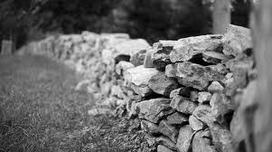 A major story this past week was the court victory for Women of the Wall. While we can't predict what will happen in the next few months, the victory illustrates both the evolving nature of the Jewish world, and what can be accomplished in the continuing struggle for inclusivity when passion is wed to the willingness to take risk. It took 20 years for this this day to come. You may have noticed that this post's title is "Woman of the Wall", and not "Women of the Wall." That is because as a result of the action of many brave and relentless women, the boundary of where and how women can pray at The Western Wall has been moved. It reminded me of the following true story, about a woman, and a wall. Lee Bluemel, a Unitarian Universalist minister tells the story: "It happened in the years preceding the Second World War. A Quaker woman came to work as a nurse in a small Catholic village in Poland. There were no other nurses or doctors there, so the Quaker nurse did just about everything. She birthed the babies, tended the sick, set broken bones, cared for the dying. There was plenty to do, and it was good work, so the Quaker nurse stayed on. She stayed for the year, and then a second year, and a fourth year, a tenth year and by then the villagers stopped counting. The Quaker nurse was practically one of them. The villagers loved her. The first babies she had delivered turned into fine young men and strong young women. Their aging mothers came to her with confidences and hot chicken pot pies. Then one day the Quaker nurse died. The villagers needed a place to say their good-byes and bury the body so she could rest in peace. But the village was a small one, and it had only one cemetery – A Catholic cemetery. You couldn’t bury a Quaker nurse in a Catholic cemetery. It was illegal. There was nowhere for her to go ...or so it seemed. The villagers got together. They asked one another: What could be done? After much deliberation, they decided to bury the Quaker nurse just outside the cemetery’s stone wall. It was the best they could do. The young men dug the grave, the villagers said their good-byes. They had loved her. Some cried. Then as the sun began to set, slowly they walked back to their homes. Darkness came. All was quiet.......Except for one sound – an odd sound—out be the cemetery. If you listened very carefully, you could tell it was the sound of stone scraping against stone. And, there was another sound too – the sound of labored breathing. The young men and the young women were moving the stones of the cemetery wall. They worked in silence, breathing hard, with the help of their mothers and fathers. When the sun came up the next day, it turned out that the Catholic cemetery in the little Polish village was just a bit larger than it ever had been before. As for how it got that way, when the villagers were asked, no one seemed to know. But the next night all of the villagers – even the Quaker nurse – rested in peace.” 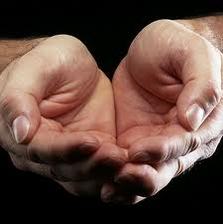 One of my visions for Minyan Oneg Shabbat, the nascent Jewish Renewal community that I started last November here in Washington, DC, is for our Shabbat service to provide an opportunity for members of the kahal to share their Torah, their story, and to see their story as imbedded in our story - the Torah. A week prior to each Shabbat that we meet I set a kavvanah, an intention for the service based on the parsha , and then invite members of the kahal to bring in a poem, a song, a chant, or a story as an offering. I then weave their offerings into the body of the service, and together with music and song, silence and discussion, t'fillah and Torah, we make magic. There is something very important about being seen and being heard. This past Shabbat we read a double parsha, Acharei Mot/Kedoshim. Amitai Gross, who I will miss dearly when his journey continues in graduate school at Brandeis this fall, offered this piece of his heart. With his permission, I am proud to share it with you. Great Holiness by Amitai Gross I believe in an ever-present-yet-ever-distant, all-encompassing, life-force, beyond our comprehension and completely personal at the same time, existing and non-existing at the same time, inhabiting, encompassing, and completely outside of the constantly-expanding Universe, which is, was, and will be forever creating, shifting, molding, and recreating, setting in motion, and supporting all life, matter, and energy, real and imaginative, breathing and not, always over-simplified, humanized, characterized, attributed, and limited with names, titles, and descriptions, culminating in a nasty three-letter word: God. This nothing that is everything that is thing and not-thing encompasses the entirety of the Universe, within, and without. All of creation that was not created but always was a part of something vast and infinitesimal, six-day, big bang, and circular timeline, is part of the Great Holiness that is all and everything and nothing. This Great Holiness, this Sacred Beyond Reality, embraces all that we know and all that we don’t. In all of everything, we must be naïve to believe that of every galaxy of stars, ours is the Holiest. In all of everything, me must be fools to believe that of every sun in the galaxy, our is the Holiest. In all of everything, we must be children to believe that of every planet, full of life, be it bacterial, plant, or animal, our planet and our humans are the Holiest. Our humanity is only one part of the great cosmic unknown that we exist within. Our tribes are simply specs within the great expanse of life. Our holy cities, be they Jerusalem, Mecca, Medina, Rome, Bethlehem, The Saptapuri, or Salt Lake City, are only Holy because we’ve dubbed them so. Our holy books called Bible, Torah, Quran, Gita, Tao, Mormon, Kitab-I-Aqdas, or otherwise were created by our own hands. Our leaders and teachers, Jesus, Muhammad, Smith, Moses, Buddha, and countless Babas, are simply humans. They are no more part of the Great Holiness than you or I. They are no less part of the Great Holiness than you or I. |
Mark Novak is a "free-range" rabbi who lives in Washington DC and works, well, just about everywhere. In 2012 he founded Minyan Oneg Shabbat, home to MOSH (Minyan Oneg Shabbat), MindfulMOSH (Jewish mindfulness gathering), and Archives
June 2017
Categories
All
|


 RSS Feed
RSS Feed
